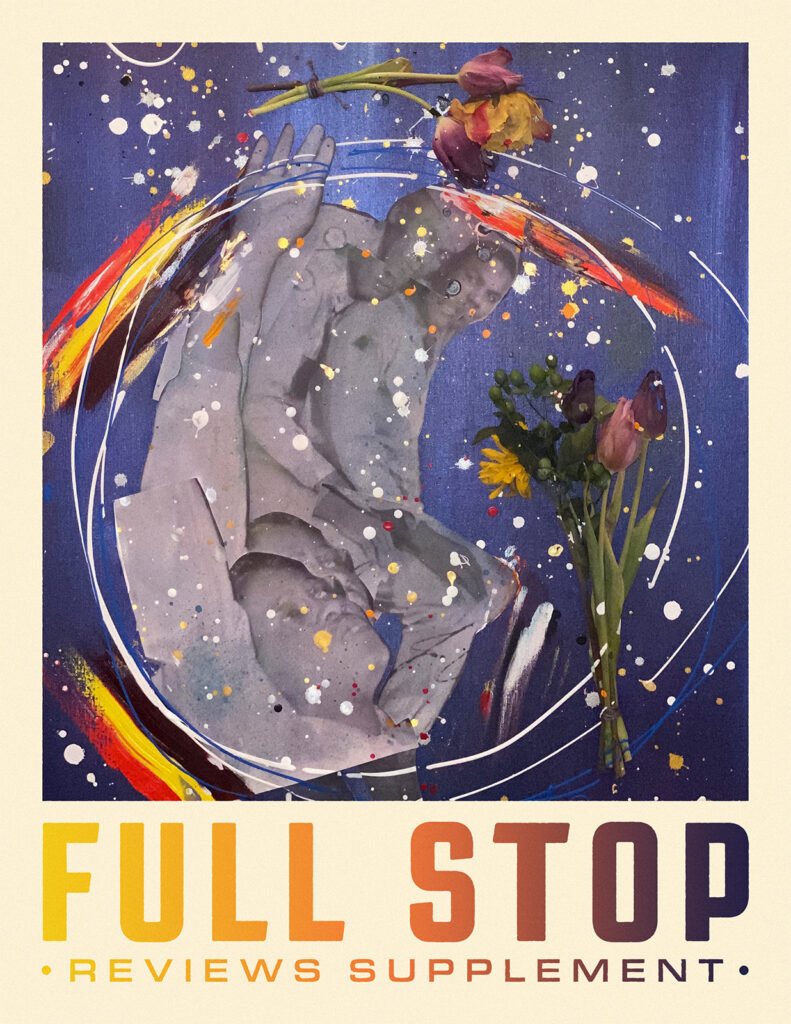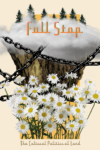The following is the introduction to the latest issue of the Full Stop Reviews Supplement. To read the rest, become a member at our Patreon page or get the single issue via Gumroad.
At the center of the cover image of this issue of the Full Stop Reviews Supplement are collaged together the early-twentieth-century black-and-white photos of a hand raised in praise, and two black men sitting together, one body leaning against another, hands nearly touching. Set against a dark blue background, ringed by bouquets of flowers and abstract gestures of splattered paint, the image seems to be an inquiry into the transcendent and transformative potential of intimacy. The image, by Ashon T. Crawley, visually encapsulates what he theorizes in his short essay “On Friendship” as “relation”: “the practice of being infused and informed and deformed and reformed.” We can learn about such radical, open, and malleable relationality, he suggests, by studying blackqueer life and blackqueer art. This is not a matter of identities, but of practices, of forms of relation that renounce the norms put in place by patriarchal and heterosexist systems of domination, and which have social as well as aesthetic dimensions.
“On Friendship,” is the first piece of the special feature on the aesthetics of black/queer relationality from this issue of the Full Stop Reviews Supplement. Like Crawley, the other contributors circle Blackness, queerness, sound, community, and arts criticism as they seek out what Crawley has termed “otherwise worlds of possibility.” For Leora Fridman and Ayden LeRoux, such worlds are created in the social act of reading. Engaging in the method, as well as the matter, of Crawley’s 2020 book The Lonely Letters (Duke University Press), they carry on a month-long epistolary correspondence, entangling themselves in one another’s lives and ideas, and the life and ideas of Crawley’s narrator, as they discuss friendship, race, vulnerability, failure, and love. In the issue’s second conversation, musician, multi-media artist, and writer Jamika Ajalon and cultural critic Dhanveer Singh Brar talk about their new books—Skye Papers (Feminist Press; 2021)and Teklife/Ghettoville/Eski: The Sonic Ecologies of Black Music in the Early 21st Century (Goldsmiths Press; 2021)—and their shared interest in black aesthetic practices that carve out autonomous zones from environments structured by white supremacy and racial capitalism. In her essay “Ain’t Nobody Caught Me,” Ajalon explores this further through the figure of the black queer fugitive in the otherwhere of afrofuturist art and writing. And Dhanveer Singh Brar finds it in the Grime music scene of East London. He writes of Grime’s sonic experiments, transmitted through illegal channels by young MCs and producers, as “a self-assembled system that was both locked into and reformulating the vision of a given time, place, and way of living. Grime was doing something with, and to, the lived sociality of Tower Hamlets, Newham, and other eastern boroughs in the early 2000s.”
The contributions to this special feature optimistically find in instances of black art and in black life practices of world building. They attest that such worlds are built not only in works of black art, but around them, in the social relations that give them form, and that they give form to: in long conversations, in letters exchanged, in the proximity of sweaty clubs and houses of prayer, in sub-cultures large and small flourishing in the cracks of the oppressively present world. And they, along with the thirty-two reviews by thirty-two reviewers of books from thirty-two different small presses also included in this issue, experiment with public literary criticism, treating writing about reading as an opportunity to place oneself in intimate relationships with the words and worlds of another and to be infused and informed and deformed and reformed by them. They demonstrate that to do justice to the work of writers marginalized socially, linguistically, and aesthetically—the kind of work that small presses make possible—public literary criticism must do more than describe and assess. It must make friends with this work, which is to say it must place itself in relation to its difference, which is to say it must discriminate only in the most basic sense of the term, which is, as Crawley writes, to “delight and joy in the gap between, the space where difference is practiced and felt and known.”
Enjoy,
Jesse Miller
Full Stop Reviews Editor
To read the rest, become a member at our Patreon page or get the single issue via Gumroad.
This post may contain affiliate links.








